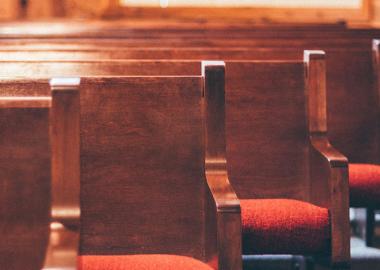We hear from groups about how they have managed to put on risk-assessed, COVID-secure performances for their audiences.
Putting on a COVID-secure performance: Grayshott Concerts | Putting on a COVID-secure performance: Witney Music Society | Putting on a COVID-secure performance: Norwich Chamber Music
Churchill Music is a series of high quality chamber music concerts held in the village of Churchill near Bristol. For bigger concerts we use a larger venue in a nearby village. We normally present at least 5 concerts a year, and our average audience size is 125. We run a ‘Champions’ scheme (we prefer this term to the word ‘friends’) which runs on a per family basis. Each family pays a yearly fee which entitles them to discounted ticket prices and the same reserved seat for each concert, plus our regular newsletters.
How did your group cope with the lockdowns?
We had to cancel the remaining two concerts of the season we were currently in, and eventually the 2020/21 season. We were humbled when many of our audience, to whom we offered refunds, asked us to keep the ticket money and give it to the musicians – we were grateful to be able to help support professional musicians in this way.
We were concerned about our community, as many of our Champions were in the senior category and feeling isolated. We were keen to get going again to give them a boost, but also concerned about starting too soon so that we didn’t encourage the spread of the virus. We produced a weekly ‘Music for Lockdown’ newsletter with links to online performances that we thought they would enjoy, until we were able to restart. With the help of Making Music’s guidance, we were eventually able to plan a concert to take place in October 2021, with artists from one of the previously cancelled concerts.
Tell us about the first concerts you held once lockdown restrictions were eased.
We contacted an artist previously scheduled for April 2021 to book them for the new date, and arranged to use the bigger venue in the neighbouring village so that we had more space for social distancing and better ventilation. We were most nervous about getting a report of an infection following the concert, but we were also nervous that people would not feel confident to come. We needn’t have worried – it was a sell- out and no infections were reported.
We had tentatively planned a second concert for November 2021 but we did not confirm or advertise it until we saw how the October concert went. With the first one under our belt, we felt much more confident and were able to go ahead with the second – also a sell-out. We also provisionally planned a third, to be confirmed once the second one had taken place – but then Omicron came along and we took the decision to cancel that one.
What are your plans for concerts going forwards?
At time of writing, there are many uncertainties. Although restrictions are being lifted, we are mindful of the health of our community and we want to do all we can to protect them, whilst ensuring that our concerts are viable and our featured artists feel confident about travelling and performing. As such, we have decided not to plan an entire season at the moment, but instead to keep planning one concert at a time. Our recent concert in March 2022 was able to go ahead, and as a result we have felt confident about confirming the date and artist for our next concert in May.
What has been positive about planning in this way, and what has surprised you?
Musicians are keen to get going, willing to listen to and understand our concerns about putting on a concert, and are working with us to find solutions. They are particularly keen to help each other recover from the effects of the pandemic, and if musicians we approach are not available to perform for us, they have been recommending other musicians. One really interesting thing as a result of this has been that some of the musicians we have approached have been offering up some really unusual instrument combinations as alternatives. For example, an outstanding viola player has suggested bringing a viola quartet to perform. It means that we have been able to offer our audiences something different, we can hang the marketing of the event on the name of the musician, and more musicians are getting an opportunity to perform.
Now that we know people are open to booking for concerts at short notice, or when artists are not quite confirmed, we are considering whether we want to hold a ‘mystery’ concert slot as part of the season in future, where we don’t book or advertise the artist until nearer the time – much depends on how the next few concerts go and we see whether our audience has an appetite for this. Many of them do like to know who is playing and book well in advance – but the recent concerts have shown that they are also willing to come out in force when a concert is arranged at shorter notice, even with Covid restrictions in place!
Any disadvantages?
The admin and the budgeting. It is difficult to plan ahead and every concert needs to break even. The other disadvantage is having to predict how the audience will feel about attending – we’re hoping this will improve as we move into the warmer months.
What tips do you have for other promoting groups planning on a concert-by-concert basis?
- Have courage, and keep in touch with your concert-goers to inform them of your events.
- Have your eye on one of your concerts featuring a star performer – it will generate a sense of intrigue as to who your next concert might feature. You are only as good as your last concert!
We hope you find this Making Music resource useful. If you have any comments or suggestions about the guidance please contact us. Whilst every effort is made to ensure that the content of this guidance is accurate and up to date, Making Music do not warrant, nor accept any liability or responsibility for the completeness or accuracy of the content, or for any loss which may arise from reliance on the information contained in it.









